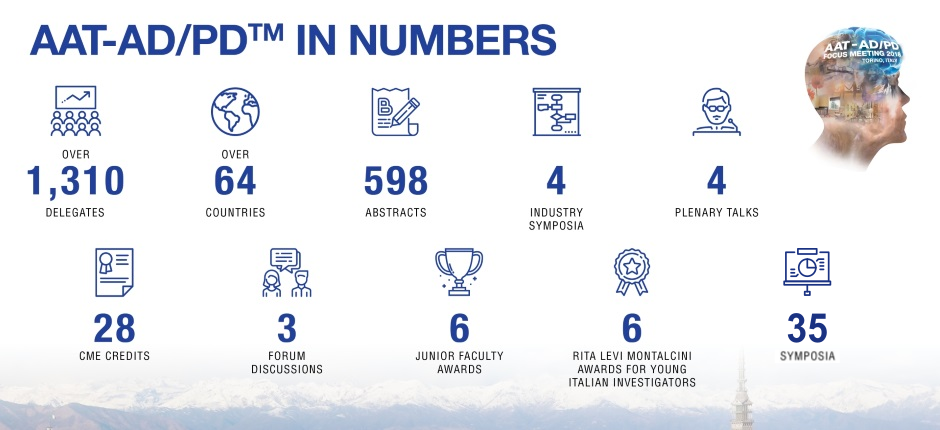AAT-AD/PD™ 2018
15-18 March 2018 | Torino, Italy
The first AAT-AD/PD™ Conference in Torino was a huge success, hosting over 1300 participants.
AAT-AD/PD™ 2018 presented all the latest breakthroughs in treatment, translational R&D, early diagnosis, drug development and clinical trials in Alzheimer’s, Parkinson’s and other related neurological disorders.
A central theme was to further advance innovative strategies in therapy and prevention, clinical trials and diagnostic markers discussed in the sessions and corridors at AD/PD™ 2017, in order to focus on driving successful collaborations among academia and industry, leading to the development of innovative drugs and ultimately providing for a better future for patients and families affected by neurodegenerative diseases.
Organizing Committee
Ezio Giacobini, Switzerland, Co-President
Gabriel Gold, Switzerland, Executive Organizer
Abraham Fisher, Israel, Co-President
Roger M. Nitsch, Switzerland, Executive Organizer
Manfred Windisch, Austria, Executive Organizer
Conference Website: https://aat-adpd2018.kenes.com/
Women’s Brain Project reports on its recent symposium on sex and gender differences in neurodegenerative diseases at the AAT-AD/PD™ in Torino
“Exceptionally, the meeting featured a symposium on sex-differences in neurodegenerative diseases, prepared in collaboration with the non-profit organisation Women’s Brain Project (WBP).”
ALZFORUM CONFERENCE COVERAGE SERIES
After Plasma Aβ, Now Plasma P-Tau181 Shows Promise
“Elusive as it has been for years, the goal of a blood test to detect Alzheimer’s disease appears suddenly achievable. Researchers at the first Advances in Alzheimer’s and Parkinson’s Therapies Focus meeting, held March 15–18 in Turin, Italy, have brought plasma p-tau181 into play”
To Block Tau’s Proteopathic Spread, Antibody Must Attack its Mid-Region
“Remember the epitope debate around therapeutic Aβ antibodies? N-terminal versus mid-region versus C-terminal—which would be most effective? At AAT-AD/PD™, a similar conversation erupted for tau antibodies.”
DIAN and ADNI Data Say Familial and Sporadic AD Converge
“Is dominantly inherited AD the same or different from sporadic AD? And what role does aging play? These questions spark debate whenever they come up, and researchers with the Dominantly Inherited Alzheimer Network set out to answer them once and for all.”
Alzheimer’s Incidence is Rising, Not Falling, a Researcher Says
“In the last few years, numerous studies have reported that dementia incidence is falling in the developed world. The drop in new cases has been attributed to better public health, in particular improved blood pressure control, but this conclusion may not tell the whole story.”
News From the PET Front: Early Amyloid Networks and Tau Mystery
“Swedish researchers introduced a new method for analyzing amyloid accumulation in brain networks that could become an extremely early biomarker in people who have not yet reached the brain-wide cutoff for amyloid positivity.”
Parkinson’s Treatments Go After Genetic Targets
“Current treatments for Parkinson’s disease target motor symptoms, and do nothing to halt progression or address other aspects of the disease. To get beyond this state of affairs, researchers are targeting the underlying disease pathology.”
Do Immune Responses Promote, or Prevent, Parkinson’s Disease?
“Michael Schlossmacher of the Ottawa Hospital Research Institute, Canada, reported that the PD-linked gene LRRK2 helps mice fight bacterial and viral infections. Together with previous findings that animals release α-synuclein in response to infection, the data support the idea that microbial exposure could play a role in neurodegenerative disease.”
Will PET Tracer, Monkey Model, Finally Bulk Up Toolbox for Parkinson’s?
“As Parkinson’s researchers push beyond symptom management to disease modification, they need far better tools to gain a deeper understanding of how α-synuclein misbehaves in the brain. Topping their wish list is a PET tracer to visualize Lewy bodies in living people, and at the first AAT-AD/PD™ Meeting in Turin, Italy, there finally was some anticipatory buzz based on a candidate that will head to human trials this year.”
Parkinson’s Treatments Go After Genetic Targets
“Current treatments for Parkinson’s disease target motor symptoms, and do nothing to halt progression or address other aspects of the disease. To get beyond this state of affairs, researchers are targeting the underlying disease pathology. They take guidance from genetic studies that have highlighted the major molecular players, such as α-synuclein, GBA, LRRK2, and tau.”


